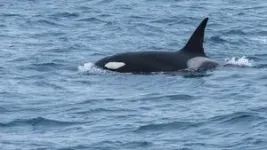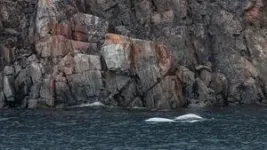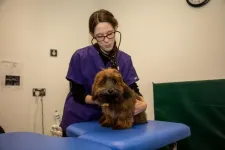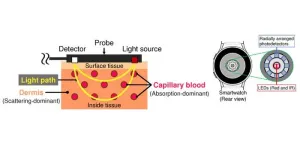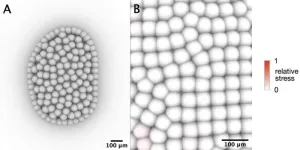(Press-News.org) Pioneering research to protect and conserve Arctic whale populations is to begin under a new five-year collaboration between Heriot-Watt University in Edinburgh, Scotland and HX Expeditions (Hurtigruten Expeditions), a world leader in travel exploration.
The partners have signed a five-year Memorandum of Understanding (MoU), beginning in 2024, to research challenges facing marine life in the high Arctic – the most northern part of the Arctic region and one of the world’s most fragile ecosystems.
The agreement will see Heriot-Watt University and HX work together on the Whales & Arctic Vessels Project (WAVE), a collaboration driven by the urgent need to better understand how often and where whales are encountering vessels in the high Arctic, and how whales are responding to these interactions – an area of research that remains largely unexplored.
“We have very little understanding about how frequently Arctic whales are encountering vessels in the high Arctic and how they may be impacted by these interactions,” explained project lead Dr Lauren McWhinnie, an Assistant Professor at Heriot-Watt’s School of Energy, Geoscience, Infrastructure and Society.
“We know in other areas of the world that whales can be affected by vessels in a variety of ways, from exposure to underwater noise to being physically stuck or disturbed. As vessel activity increases in the Arctic, it's important that we work with industry, policy makers and communities to ensure that the maritime sector is operating in a responsible and sustainable manner and is not placing any further pressure on these animals whose habitat is significantly changing due to climate change.”
Heriot-Watt University is the first UK university to partner with HX in a project of this scale. The collaboration will see the two organisations jointly publish findings, delivering impact reports and scientific results that will further the understanding of the pressures on Arctic whale populations and contribute to global conservation efforts.
The partnership will harness HX’s extensive expedition network and will benefit vastly from the company’s ability to engage both guest passengers and the wider public in this important environmental research. Heriot-Watt’s researchers will benefit from access to multiple vessels within the fleet, enabling scientists to conduct multi-year data collection in areas rarely surveyed. Passengers aboard HX ships on planned commercial voyages will also have the opportunity to participate in citizen science programmes, both contributing valuable data and allowing them to see how their contributions can make a difference.
Dr Verena Meraldi, Chief Scientist for HX, said the research would help improve our understanding of the pressures on Arctic whales and enrich the knowledge and experience HX can provide to its guests.
“As Chief Scientist for HX, I have the honour of working alongside various scientists across different disciplines to get a deeper understanding of the processes governing our planet, and the impact we (as humans) are having on it,” Dr Meraldi said. “Conveying this to our guests and getting them involved in projects such as WAVE is exactly the kind of project we look to support. We hope by supporting this project we will support further knowledge and understanding of Arctic whales, and also enrich the journeys and mindset of our guests. This MoU represents a vital collaboration between academia and industry, aiming to advance the scientific understanding of Arctic ecosystems, while making a tangible contribution to whale conservation in the region.”
The collaboration aims to promote global awareness and support the conservation of Arctic whale species, while gathering critical data to inform and support evidence-based management strategies. WAVE also seeks to foster academic growth in marine sciences by supporting and developing the next generation of researchers.
With increasing vessel activity being documented in the Arctic, it is crucial for academia to work alongside industry partners, policymakers, and local communities to ensure that both future and current use of this marine space takes place in a responsible and sustainable manner, the scientists say. This is particularly important given the significant changes to the habitat of Arctic whales, caused by climate driven sea ice reductions, and the need to avoid adding further pressures on these vulnerable species.
Dr McWhinnie said: “When we are working to conserve whales, we are so often on the back foot – reacting to deal with a problem that is already having a documented impact. What’s incredibly exciting about this research is that we are being more proactive, trying to make sure an impact doesn’t occur, and learning from lessons we’ve seen arise elsewhere. As a researcher this is a truly fantastic opportunity to bring about a positive change, and I’m incredibly excited to work with our partners, HX Hurtigruten Expeditions, to ensure that future vessels visiting the Arctic will have a minimal impact on these incredible animals.””
END
Arctic whales research collaboration is signed by Heriot-Watt University and HX Expeditions (Hurtigruten Expeditions)
Project will study where and how often whales encounter vessels in the high Arctic
2024-10-29
ELSE PRESS RELEASES FROM THIS DATE:
Scientists develop tool to predict sepsis in apparently healthy newborns
2024-10-29
A genetic signature in newborns can predict neonatal sepsis before symptoms even start to show, according to a new study.
The study, led by UBC and SFU researchers in collaboration with the Medical Research Council (MRC) Unit The Gambia, has the potential to help healthcare workers diagnose babies earlier, including in lower- and middle-income countries (LMICs) where neonatal sepsis is of particular concern. The research, published today in eBiomedicine, is funded by the National Institutes of Health and the Canadian Institutes of Health Research.
“Neonatal sepsis is caused by the body’s irregular response ...
AI algorithm accurately detects heart disease in dogs
2024-10-29
Researchers have developed a machine learning algorithm to accurately detect heart murmurs in dogs, one of the main indicators of cardiac disease, which affects a large proportion of some smaller breeds such as King Charles Spaniels.
The research team, led by the University of Cambridge, adapted an algorithm originally designed for humans and found it could automatically detect and grade heart murmurs in dogs, based on audio recordings from digital stethoscopes. In tests, the algorithm detected heart murmurs with a sensitivity ...
What animal societies can teach us about ageing
2024-10-29
Red deer may become less sociable as they grow old to reduce the risk of picking up diseases, while older house sparrows seem to have fewer social interactions as their peers die off, according to new research which shows humans are not the only animals to change our social behaviour as we age.
A collection of 16 studies, including six from the University of Leeds, have been published today as part of a special issue of the Philosophical Transactions of the Royal Society, investigating ageing and society across the natural world.
One study into red deer shows that ...
Enhancing the accuracy of wearables that measure blood glucose levels
2024-10-28
Diabetes is an increasingly pervasive disease, currently affecting over 500 million adults worldwide. Since there is as yet no cure for type 1 or type 2 diabetes, patients must regularly monitor their BGLs to keep them in check. Though BGL-measuring devices relying on painful finger pricks have been the gold standard for decades, modern technology is slowly opening doors to better alternatives.
Many researchers have proposed noninvasive methods to monitor BGLs using widely available wearable devices, such as smartwatches. For example, by placing the LEDs ...
Increasing social supports for new mothers with opioid use disorder
2024-10-28
Opioid use disorder (OUD) is a growing public health problem among pregnant and parenting people in the U.S. Between 1999 and 2014, the number of pregnant women with OUD increased by more than four times. This trend also coincides with a rise in pregnancy-associated maternal overdose mortality.
Researchers at Thomas Jefferson University, led by Meghan Gannon, PhD, MSPH, investigated how community-based supports, like doulas, can be integrated into health care for mothers who use opioids. Using a social network analysis, ...
Mitigating the neurotoxic effects of lead exposure
2024-10-28
Lead exposure is a risk to any human, but children are most vulnerable to the element’s neurotoxicity, which can lead to developmental delays, learning difficulties and mood changes among other symptoms. There has been some progress in reducing exposure and preventing neurotoxicity, but hundreds of thousands of American children are still affected.
A new study by Thomas Jefferson University neuroscientist Jay Schneider, PhD, suggests that the toxic effects of lead can be mitigated by attentive maternal care and an enriched environment ...
Developing kidneys from scratch
2024-10-28
To Alex Hughes, Assistant Professor in Bioengineering within Penn Engineering and in Cell and Developmental Biology within Penn Medicine, the kidney is a work of art. “I find the development of the kidney to be a really beautiful process,” says Hughes.
Most people only ever see the organ in cross-section, through textbooks or by dissecting animal kidneys in high school biology class: a bean-shaped slice with lots of tiny tubes. “I think that really undersells how amazing the structure is,” says ...
Airbnbs associated with more crime in London, new study shows
2024-10-28
Since its founding in 2008, the short-term homestay platform Airbnb has expanded to 100,000 cities in more than 220 countries, and, according to data from the company, 1.5 billion guests had stayed in Airbnb-listed properties through 2023.
Much of the academic research on Airbnb activity comes from economics and business literature and focuses on housing-supply impacts, says David Kirk, professor of criminology at the University of Pennsylvania. Yet research on neighborhood impacts is limited, and that research neglects the impacts of Airbnb activity on measures of community cohesion and safety.
Kirk teamed with University of Cambridge criminologist ...
New study finds invasive plants drive homogenization of soil microbial communities across U.S.
2024-10-28
Invasive plants are doing more than just taking over landscapes — they’re also changing the soil beneath them. A new study co-authored by Matthew McCary, assistant professor of biosciences at Rice University, reveals that these species are reshaping soil microbial communities across the U.S., making them more uniform and altering how ecosystems function. The findings, published in Proceedings of the National Academy of Sciences on Oct. 24, shed light on the far-reaching impacts of invasive plants, which extend beyond what we see above ground.
The ...
Researchers’ new outreach strategy succeeds, sets blueprint for detecting invasive species in Florida
2024-10-28
Invasive species in Florida like Nile monitors and Argentine black-and-white tegus pose a growing threat to the Sunshine State’s environment, economy and public safety. South Florida’s warm climate, disturbed habitats and bustling pet trade have made it a hotspot for these non-native, cryptic reptiles. However, finding these elusive creatures has always been a challenge – until now.
University of Florida researchers are showcasing how a focused outreach initiative in Palm Beach County has led to a successful increase in reports of invasive reptiles in Florida. The findings are documented in the latest study published in Scientific Reports and authored by researchers at UF/IFAS ...
LAST 30 PRESS RELEASES:
Blood test predicts which bladder cancer patients may safely skip surgery
Kennesaw State's Vijay Anand honored as National Academy of Inventors Senior Member
Recovery from whaling reveals the role of age in Humpback reproduction
Can the canny tick help prevent disease like MS and cancer?
Newcomer children show lower rates of emergency department use for non‑urgent conditions, study finds
Cognitive and neuropsychiatric function in former American football players
From trash to climate tech: rubber gloves find new life as carbon capturers materials
A step towards needed treatments for hantaviruses in new molecular map
Boys are more motivated, while girls are more compassionate?
Study identifies opposing roles for IL6 and IL6R in long-term mortality
AI accurately spots medical disorder from privacy-conscious hand images
Transient Pauli blocking for broadband ultrafast optical switching
Political polarization can spur CO2 emissions, stymie climate action
Researchers develop new strategy for improving inverted perovskite solar cells
Yes! The role of YAP and CTGF as potential therapeutic targets for preventing severe liver disease
Pancreatic cancer may begin hiding from the immune system earlier than we thought
Robotic wing inspired by nature delivers leap in underwater stability
A clinical reveals that aniridia causes a progressive loss of corneal sensitivity
Fossil amber reveals the secret lives of Cretaceous ants
Predicting extreme rainfall through novel spatial modeling
The Lancet: First-ever in-utero stem cell therapy for fetal spina bifida repair is safe, study finds
Nanoplastics can interact with Salmonella to affect food safety, study shows
Eric Moore, M.D., elected to Mayo Clinic Board of Trustees
NYU named “research powerhouse” in new analysis
New polymer materials may offer breakthrough solution for hard-to-remove PFAS in water
Biochar can either curb or boost greenhouse gas emissions depending on soil conditions, new study finds
Nanobiochar emerges as a next generation solution for cleaner water, healthier soils, and resilient ecosystems
Study finds more parents saying ‘No’ to vitamin K, putting babies’ brains at risk
Scientists develop new gut health measure that tracks disease
Rice gene discovery could cut fertiliser use while protecting yields
[Press-News.org] Arctic whales research collaboration is signed by Heriot-Watt University and HX Expeditions (Hurtigruten Expeditions)Project will study where and how often whales encounter vessels in the high Arctic

